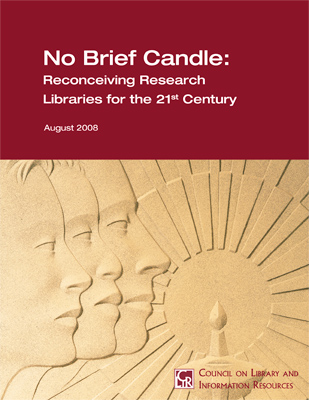No Brief Candle: Reconceiving Research Libraries for the 21st Century

August 2008
Copyright 2008 by the Council on Library and Information Resources. No part of this publication may be reproduced or transcribed in any form without permission of the publishers. Requests for reproduction or other uses or questions pertaining to permissions should be submitted in writing to the Director of Communications at the Council on Library and Information Resources.
Cover image: © 2008 Mary Bono c/o theispot.com
Life is no brief candle to me. It is a sort of splendid torch which I have got a hold of for the moment, and I want to make it burn as brightly as possible before handing it onto future generations.
-George Bernard Shaw
Part I: A Continuing Discussion on Research Libraries in the 21st Century
Introduction
Prologue to a Fundamental Rethinking: Context and Topic Threads
Reconceiving the Library: A Vision for the 21st Century
Challenges and Constraints
Recommendations
Part II: Essays
The Research Library in the 21st Century: Collecting, Preserving, and Making Accessible Resources for Scholarship, by Abby Smith
The Future of the Library in the Research University, by Paul N. Courant
Co-teaching: The Library and Me, by Stephen G. Nichols
The Role of the Library in 21st Century Scholarly Publishing, by Kate Wittenberg
A New Value Equation Challenge: The Emergence of eResearch and Roles for Research Libraries, by Richard E. Luce
Accelerating Learning and Discovery: Refining the Role of Academic Librarians, by Andrew Dillon
Groundskeepers, Gatekeepers, and Guides: How to Change Faculty Perceptions of Librarians and Ensure the Future of the Research Library, by Daphnée Rentfrow
Leveraging Digital Technologies in Service to Culture and Society: The Role of Libraries as Collaborators, by Lee L. Zia
Foreword
This new title from CLIR, No Brief Candle: Reconceiving the Research Library for the 21st Century, is composed of a series of provocative essays, the proceedings of a lively and informed symposium earlier this year in Washington, and a set of recommendations extrapolated from both. While several of the subject headings are familiar-scholarly communication, peer review, preservation of data, and e-science-the conclusions and recommendations are not. The consensus derived from these efforts was unambiguous in calling for more aggressive intervention to better structure and manage the challenges we face.
This report demands change. Common themes include collaboration between librarians, faculty, and information technology experts to articulate strategies and tactical approaches to a rapidly changing environment. This represents a broad research agenda that cannot be executed by a single profession. We are asked collectively to rethink current hiring practices, to provide for new career paths and opportunities for professional development, and to consider redefining libraries as multi-institutional entities. The latter entails a mandate to eliminate redundancy by calibrating resources, staff, and infrastructure functions to the collective enterprise of the federated institutions. This transcends the traditional concept of a library (and by extension a university or college) while preserving the programmatic strengths and mission of the individual schools, and in fact should enhance intellectual productivity in a far more cost-effective fashion.
As the title of this report suggests, this is not a passing phase in higher education. It is a transformational period that requires innovation and risk. I sincerely hope this publication will engender further discussion, new ideas, and collaborative efforts that respect our traditions while recognizing the urgency for invigorated leadership and new direction.
Charles Henry
President
Council on Library and Information Resources
Conference Participants
Charles Henry, Chair, President, Council on Library and Information Resources
Fran Blouin, Director, Bentley Historical Library, University of Michigan
Paul Courant, University Librarian and Dean of University Libraries, University of Michigan
Andrew Dillon, Dean, School of Information, University of Texas at Austin
David Ferriero, Andrew W. Mellon Director and Chief Executive of the Research Libraries, New York Public Library
Amy Friedlander, Director of Programs, Council on Library and Information Resources
Marianne Gaunt, University Librarian, Rutgers University
Suzanne Lodato, Director, Division of Preservation and Access National Endowment for the Humanities
Richard Luce, Vice Provost and Director of Libraries, Emory University
Stephen G. Nichols, James M. Beall Professor of French and Humanities, The Johns Hopkins University
James O’Donnell, Provost, Georgetown University
Jerry Persons, Chief Information Architect, Green Library, Stanford University
Wendy Pradt Lougee, University Librarian, University of Minnesota
Joyce Ray, Associate Deputy Director for Library Services, Institute for Museum and Library Services
Daphnée Rentfrow, Former CLIR Postdoctoral Fellow in the Humanities; current MLIS student
Stephen Rhind-Tutt, President, Alexander Street Press
Abby Smith, Consultant
Kathlin Smith, Director of Communications, Council on Library and Information Resources
Donald Waters, Program Officer for Scholarly Communications, The Andrew W. Mellon Foundation
Steven Wheatley, Vice President, American Council of Learned Societies
James F. Williams II, Dean of Libraries, University of Colorado at Boulder
Kate Wittenberg, Manager, Center for Digital Research and Scholarship, Columbia University
Karin Wittenborg, University Librarian, University of Virginia
Lee Zia; Program Manager, National Science, Technology, Engineering and Mathematics Education Digital Library Program; National Science Foundation

